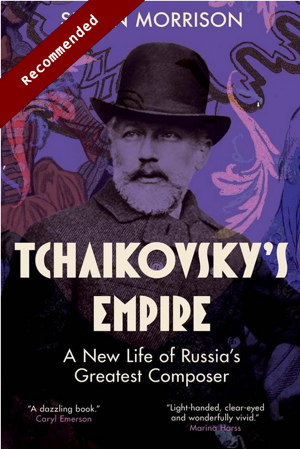
Tchaikovsky’s Empire: A New Life of Russia’s Greatest Composer
by Simon Morrison
Published 2024
Hardcover, 359 pages
SBN 978-0300192100
Yale University Press
No sooner had the escalation of hostilities in the Russo-Ukrainian War begun in spring 2022 than classical music, deprecated by the mainstream for decades, was thrust into global headlines. Suddenly and dramatically, Russia’s voluminous contribution to the genre became a proxy battlefield for competing nationalisms and ideologies, not to mention cynical journalists and the terminally online denizens of social media. Academic and aesthetic discussions, as a result, quickly degenerated into trench warfare and bloodsport, with the author of the deathless “None but the Lonely Heart” a key target.
Tchaikovsky, who though mostly apolitical veered towards the conservatism of his time, would probably have looked upon these clashes that are nominally fought for (or against) him with bemusement. Yet they did not emerge from a vacuum. War, empire-building, and the mythos of nationalism were, as Simon Morrison says in his Tchaikovsky’s Empire: A New Life of Russia’s Greatest Composer, elements of the very soil from which he emerged. The composer’s hometown of Votkinsk was already an important manufacturer of Russian materiel long before its most famous son was born there in 1840; it continues to maintain this status to this very day, even after the disastrous unraveling of imperial aspirations that occurred at opposite ends of Russia’s 20th century.
“Plus ça change”, but Morrison quickly reminds his reader that for all its surface similarities, the composer’s world is remote, even unknowable to us. Much of what is now perceived as “Tchaikovsky”, he warns, is an elaborate construct, begun while his cholera-ravaged body was still warm, and which posterity has continuously tweaked and distorted to flatter its mercurial conceits.
One of Morrison’s most memorable examples is of the death and unlikely transfiguration of Tchaikovsky’s first opera, The Voyevoda. A box office failure he later destroyed, it was reanimated by Soviet musicologists as part of their dubious aim to reframe its composer as essentially a Russian musical nationalist—and a proto-revolutionary one at that!
And so, what we are listening to when we are listening to The Voyevoda is what Tchaikovsky might have composed had he lived in the era of socialist realism. This Dream of the Volga is thickly scored and rigid in its number format. There’s no mention of the tsar. The reconstruction is as faithful to the original as the surviving sources and Soviet political context would allow. It’s also, however, bizarrely influenced by the poor reviews of the original The Voyevoda. Because the critics didn’t like it, [Soviet musicologists] felt that they should fix it. So much for historical accuracy…
Tchaikovsky was beset throughout his life (and long after) by the attentions of hangers-on, nagging busybodies, and deceptive well-wishers. Whether with the composer’s consent or not, they often succeeded in turning his native sense of equipoise into something more immediately marketable. Their most enduring contributions were the steroid-addled modifications they inflicted upon the Piano Concerto No. 1; seized upon with alacrity, then further exaggerated by the rival superpowers and their satellites for the sake of propaganda during the height of the Cold War.
Much of these distortions to music and biography are enabled by a public that largely subscribes to John Warrack’s contention that the “central emotional problem” in Tchaikovsky’s life was his homosexuality, a matter that Timothy L. Jackson embroidered with speculation that it led to the composer becoming an “outcast”. Tchaikovsky, in fact, not only was untroubled by his sexual inclinations, but it likely concerned his social environment, including the Russian imperial court, even less than the sensation-hungry commentators of today.
Like Jonathan Carr in his Mahler: A Biography, Morrison slashes the overgrowth of fantasy, rumor, and plain bad scholarship that have accumulated onto his subject with insight and observations sharpened by detached wit. “His music is a manifestation (not a reflection) of his personality”, he clarifies. Demythologized, Tchaikovsky is presented by Morrison as he was, not as how the reader may wish to see him. Rather than the prey of destiny, he was its master. His art, directly expressive and self-controlled, emerges from this book’s pages as an abiding retort to the Romanticism of his times—as well as our own era of uncontrolled emotionalism.
Néstor Castiglione
Interview with the author
Buying this recording via a link below generates revenue for MWI, which helps the site remain free.



















